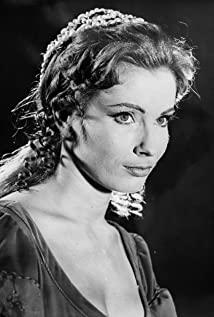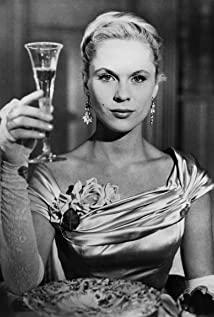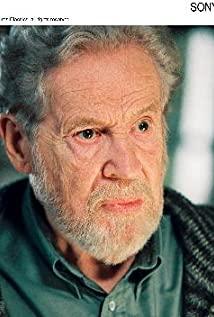Tolstoy said, "Happy families are all alike, and every unhappy family is unhappy in its own way." After reading "Marriage Life" directed by Bergman, I was thinking, "Happy marriages are all similar, unhappy Marriages have their own misfortunes." In this film, the director lets the hero and heroine experience all kinds of misfortunes in their married life, from not understanding their husbands, to disharmony in their sex lives, to extramarital affairs, to getting tired of extramarital affairs, to not being able to return home. From marriage to divorce, to finally being honest with each other.
The film was shot in Sweden in the 1970s, and the fiasco marriage theme is inseparable from the director's four marriages in his life. And if you just see this show as a portrait of married life, it would be underestimating Bergman.
I watched the TV version, which was 295 minutes in total and divided into six episodes. The first two episodes described their seemingly bland and happy marriage, but they bought all kinds of foreshadowing for their later derailment. In the third and fourth episodes, the male protagonist Joan confessed that he had cheated on him and wanted to run away with his lover, while the female protagonist Marian went from being sad and struggling to find herself again. Joann's life goes down in episodes five and six, while Marianne becomes extra confident and enjoys her life, and they start dating again and candid with each other.
In the movie, a main line is the monologue of married life, where there is boredom, lies, and forbearance.
Another line is a woman's awakening, from being obedient to her husband, to starting to reorganize her life, find herself, reinvent herself, and see life clearly.
In the first act of the film, the female protagonist Marianne's journalist classmates come to interview them. Marianne is a lawyer specializing in marriage and family law. Most of her daily work is to handle divorce cases. The male protagonist, Joan, is an associate professor of the Psychological Technology Society. They have two daughters and have been happily married for more than ten years.
When the reporter asked him to introduce himself, her husband, Qiao An, boasted and confidently introduced his work, life, current situation, and advantages. And when it was Marianne's turn, she didn't know what to say.
Remember that in ancient China, most women did not have names. Since ancient women rarely participated in social affairs and seldom communicated with the public, ancient women did not need to have names. mother." That's it.
One night Marianne and Joan said that she was pregnant, and it was an unexpected pregnancy. She asked her husband Joan for advice, but Joan let her decide for herself, saying, "I don't care." Neither of them expressed their position. Joan actually didn't want this child, but Marianne always wanted to keep it, so he patted Marianne alone, and the two continued to read their respective books.
Marianne suddenly burst into tears, and Joann said that he didn't actually want the child. After the quarrel and discussion between the two, they decided to abort the child.
Marianne was in the ward, and Joanne came to visit her. They discussed the trivial matters of life and the summer resort they were about to go to, but they avoided talking about their children. In later scenes, it can be seen that avoiding pain is the way two people often deal with problems. And the things that are avoided do not mean that the heart does not know, does not doubt, is not confused, and is not uncomfortable. After Joanne was gone, Marianne put the quilt over her head and cried.
The first act ended with Marianne's cries, which remained in my heart for a long time.
Is it a woman's forbearance? Or anger at your own incompetence? Marianne confessed to Joan that she wanted this child very much. If she had an abortion, it would be like killing herself, but Joan replied indifferently, asking him to think about the scene of giving the first two children diapers and being unable to sleep. Then they discussed how to explain to their two daughters if they wanted a child. Finally Marianne said:
I guess the problem is not with the kids but with you and me.
One day, an elderly woman came to Marianne's office. The woman said she was coming for a divorce. When asked by Marianne, this woman has been married for more than 20 years, and her material life is good. She and her husband have no extramarital affairs, but she insists on divorce. Marianne was curious and asked her why she wanted a divorce?
Because there is no love in my marriage.
Then the old woman begins a long monologue, and I love her analogy of life numbness, "It's like, my hand is touching the table, and I can tell I'm touching it, but I can't feel it ."
The old woman's description of married life alarmed Marianne, who seemed to see a shadow of her own life in the description.
But after get off work, I still went on a date with Joan. During the date, Marianne put out some travel recommendations and wanted to negotiate a trip with Joanne, but Joanne rejected it, claiming "I don't like staring at the hot sun and traveling the world, especially when I can go fishing." Marianne smiled and said, "In that case, it's business as usual." She put away the pictorial in her hand.
Joanne felt this unpleasant, and when they talked about their problems with each other, Marianne confessed his love for Joanne, "I love you very much, and I'm afraid of losing you."
This kind of love with fear and unease made Marianne choose to endure. I don't think she loves Joanne, but fear dominates her. Because of fear, she chooses to continue the status quo marriage.
Seeing this again admires Bergman for turning the script's lines into a masterpiece. Every word they say in the movie can be found in reality. "I love you, I can't live without you", "You are my only one." Many people are familiar with these declarations of "love", and more often than not, happiness is more important than happiness with this person. Up, what more women want to know is "Does he love me or not". answer to this question.
The public account Knowyourself has an article that inspired me a lot at the time:
"I can feel the same change in myself, that I no longer look up the meaning of things in the relationship, like looking up the dictionary and comparing with the conventional standards of the public. I used to do that, but it never gave Our relationship brings any benefit. When I don't, I'm actually comfortable with the pattern, the state between us, and when I do, I get anxious and try to find an explanation for what doesn't match and meaning. I started to start with ourselves and accept what happened in the relationship. I wouldn't name the relationship, accept it as its natural progression - maybe one day this bondage I feel will just naturally go away, that Nothing. That must have been what I needed then."
Any relationship is in dynamic change, including marriage. And people often want to seek a certain sense of certainty, especially in a relatively stable relationship such as marriage, which makes people even more afraid of being shaken and changed.
And just like Marianne, people often wrap their fears in love.
Days go on, but accidents come inadvertently. One night when Marianne and her children were on vacation at the Summer Resort, Joan suddenly drove over and said that he was in love with someone else, and that he was tired of his current life and wanted to run away from home. But Joan also confessed her guilt:
After listening to Joanne's confession, Marianne asked, "What should we do?" She had no anger or sadness, but simply asked "What should we do?" She then left the decision to Joan. install.
Joanne was going to be away from his lover for about 8 months, and he chose to tell Marianne tonight that he just wanted to pack up as soon as possible.
Marianne said, "Let's go to bed, you have to leave early tomorrow." Before going to bed, Joanne said why he wanted to escape such a
This kind of life is not unfamiliar, and every day is full of things to do. This seemed to be the life of Marianne all along. After Joan left behind, Marianne began to recall her past. She began to learn expressions and began to write a diary. This monologue is almost an analysis of a woman's inner awakening:
She wrote in her diary: "For as long as I can remember, I have been so submissive, decent, almost humble. My mother taught me and my sisters to teach us to be meek. In our dealings with others, I desperately tried to please others. I never thought about what I liked, but I always thought about what others thought of me. I knew it was just cowardice, and what was more, it was all rooted in my disregard for myself.
Now, I just have a drive to find the life I live. In the little happiness of living with Joan, we are silent about everything. This is a kind of hidden cruelty and coldness. Every time I think about it, I am always more startled. Grooming our stable relationships comes at a heavy price. That is the gradual erosion of your humanity. In a split second, I will see who I will become. Knowing this earlier, I would never be willing to let others arrange my life for me.
I also wondered if I had lost myself, alone and helpless, if the source of happiness deep within me had died, or if the source was still lurking, ready to wake up and be reborn. I pondered what kind of wife and woman I wanted to be, and if I could be unfettered and self-willed, would Joan and I still be married. None of us have ever escaped the shackles of our families, and we have never created an ideal life worth living. "
This diary is a sign of Marianne waking up, thinking about herself, about her preferences, about who she is, rather than modeling herself according to the rules of morality and etiquette. If a certain responsibility is to obliterate or even restrict individual preferences, the result is likely to make things worse.
Maybe things work well for a certain period of time, like the 10-year marriage of Marianne and Joanne, but if you don't pour your own feelings into it, don't open yourself up, and just follow a model family that has been commonly known in the world Live like this, maybe you can go through your whole life, but maybe someone suddenly wakes up one day in the middle, like Joanne who is tired of being everywhere, like Marianne who starts to reflect on herself.
And the end of this marriage was not smooth sailing, and there was always a lot of entanglement in the middle. Although Marianne has begun to awaken, her inner fear has not completely disappeared.
One night Joan came back for dinner, and they chatted, and finally Joan decided to stay here for the night. During the chat, Marianne cried again, she still hoped that Joan could come back to her.
This repeated process is more real. Nothing happens in a straight line. The emotions in our hearts always have to be repeated several times before they can be subsided, and confusion is always clear after we feel that we understand it a few times.
So is Marianne.
No further progress was made. In the middle of the night, Joan got up and left.
A few years have passed, and Marianne has been enjoying her life more and more. After Joan left home, she took care of the room again. When they lived together before, the study belonged to Joan, and it was filled with his books and belongings. After Ann left, Marianne cleaned up the study and redecorated it to her liking.
She started dating. She hated sex when she was living with Joanne because she was often unable to satisfy Joanne after having a baby, she kept trying to avoid it, and in her new date, she started to enjoy physical pleasure , the sex life also began to become harmonious.
They started to get divorced. The process of signing a divorce settlement is not all smooth sailing. In Joann's office, they began to recall the past. When Marianne talked about the past, Joann said in a sarcastic and indifferent manner, "It doesn't make sense to turn over these old accounts now."
Marianne shouted angrily "Ah". "Your stupid irony is driving me crazy. What right do you have to control my thoughts and feelings?" This is the first time Marianne gets angry in the play, and Joanne begins to criticize her feminism in the face of Marianne's anger. Doctrine, started talking about her slutty sexuality, started belittling her. Even if this person is the love he once was.
Marianne spoke her inner voice:
But Joan didn't want to get divorced, he was tired of living with his lover. "Now I have become a person without a family." At this time, Joan was like a helpless child. He confided to Marianne the many troubles in his work and love life.
At this time, Marianne was already a newborn Marianne.
When I saw this, I was thinking, this show is a lot like another version of Ibsen's "A Doll's House", what will happen if Nora goes away? Married Life may be Bergman's answer to this question.
Women often start to wake up through failed relationships or marriages. They no longer exist as accessories, they no longer aggrieve themselves to satisfy each other, and they no longer live their lives in the form of performances to meet social morality and torture them. And at the deepest, waking up is just the beginning of an exploration of who I am.
Marianne's failed marriage was also a blessing.
The more I look behind, the more I feel that Bergman is not just talking about marriage, but about the process of women finding themselves through marriage.
In the beginning of the second act, Marianne and Joanne discuss not going back to her parents' home this weekend, and she plans to spend it at home with her husband and children. After she called her mother, her mother recounted how her father missed them on the other end of the phone. Although Marian was reluctant, she still promised her mother to go home for the weekend.
In the final episode, Marianne goes home to visit her mother, who wants her to attend her father's funeral, but Marianne refuses.
This woman has finally learned to say no after twenty years of marriage.
During the chat with her mother, Marianne learned how her mother and father's married life was like her own. Never quarrel, and keep silent all their lives. Marianne asked her mother the question she had always wanted to know the answer to:
"Do you have a harmonious sex life with your father?"
According to the little understanding of feminism, the evolution of feminism is accompanied by sexual liberation, and Sweden is a very feminist country. And nearly 50 years ago, older women in Swedish films still viewed sex and their bodies that way.
In fact, even today, dating has become well known, and we are ashamed to talk about sex, and it is still regarded as a way to meet the needs of men or partners. A man can honestly admit that he enjoys it, while a woman will be seen as irritable and slutty if she says so.
When do women begin to accept their bodies? And speak candidly about the needs of the body? Exist as a human being, not just anyone's tool.
At the end of the story, they both started their new marriages, and when they embraced and fell asleep again, they seemed to see love for each other.
There are still many little details in the story that I really like very much, such as Marianne confessing her previous spiritual infidelity after their respective divorces. and their respective dialogues when they hug each other at the end. This movie is 5 hours long, and most of these 5 hours are dialogues of daily life, which make me feel more real than the ups and downs of the plot.
Marriage is like a kaleidoscope through which everyone sees something different. Those who stand outside the kaleidoscope never know what is inside.
Is it the choice? Or home? Is it a carrier of love? Or an increasingly numbing medium?
I don't know the answer.
The presentation of the film is inextricably linked with the director's worldview. The happy marriage is roughly the same, and every unhappy marriage has its own unfortunate misfortune.
But what moved me the most was the growth of Marianne, the growth of a woman who had been married for 10 years after her marriage broke down. It is not as inspirational as Luo Zijun in "The First Half of My Life", but the true interpretation of human nature makes you feel this is life.
Love makes people yearn, and the intimacy and attachment it brings also makes people experience the beauty and tenderness of the world from a perspective. But being someone's wife is a reward for a person if they have to fulfill some kind of responsibility because of that status? Or the destruction of a person?
The growth of women, on the one hand, comes from self-awareness, on the other hand, from the progress and openness of society. Writing here, I can only sigh that I live in an era of relative freedom, and I can be with the people I like without any psychological burden from the outside world.
View more about Scenes from a Marriage reviews











